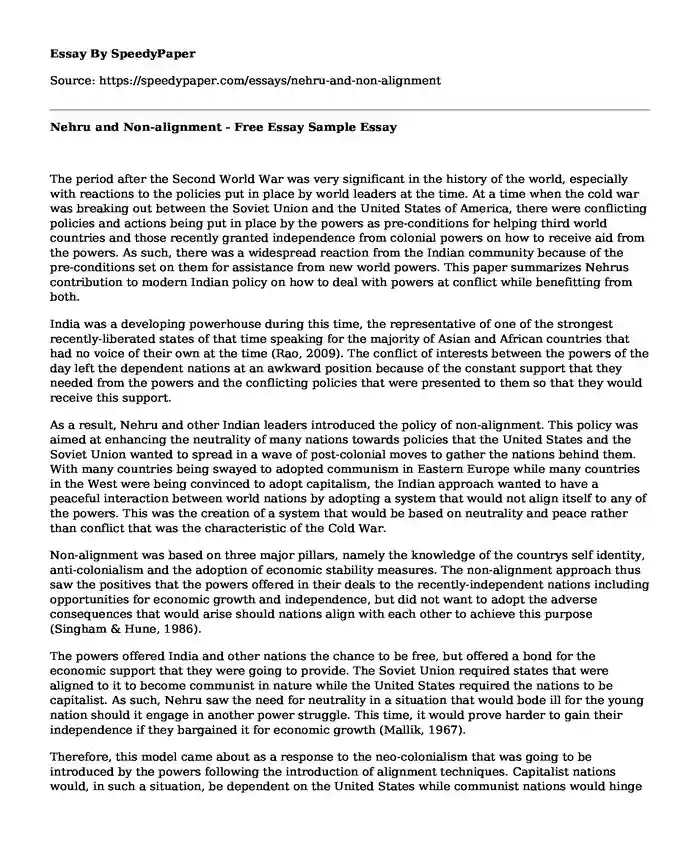
| Type of paper: | Essay |
| Categories: | Politics International relations India |
| Pages: | 3 |
| Wordcount: | 619 words |
The period after the Second World War was very significant in the history of the world, especially with reactions to the policies put in place by world leaders at the time. At a time when the cold war was breaking out between the Soviet Union and the United States of America, there were conflicting policies and actions being put in place by the powers as pre-conditions for helping third world countries and those recently granted independence from colonial powers on how to receive aid from the powers. As such, there was a widespread reaction from the Indian community because of the pre-conditions set on them for assistance from new world powers. This paper summarizes Nehrus contribution to modern Indian policy on how to deal with powers at conflict while benefitting from both.
India was a developing powerhouse during this time, the representative of one of the strongest recently-liberated states of that time speaking for the majority of Asian and African countries that had no voice of their own at the time (Rao, 2009). The conflict of interests between the powers of the day left the dependent nations at an awkward position because of the constant support that they needed from the powers and the conflicting policies that were presented to them so that they would receive this support.
As a result, Nehru and other Indian leaders introduced the policy of non-alignment. This policy was aimed at enhancing the neutrality of many nations towards policies that the United States and the Soviet Union wanted to spread in a wave of post-colonial moves to gather the nations behind them. With many countries being swayed to adopted communism in Eastern Europe while many countries in the West were being convinced to adopt capitalism, the Indian approach wanted to have a peaceful interaction between world nations by adopting a system that would not align itself to any of the powers. This was the creation of a system that would be based on neutrality and peace rather than conflict that was the characteristic of the Cold War.
Non-alignment was based on three major pillars, namely the knowledge of the countrys self identity, anti-colonialism and the adoption of economic stability measures. The non-alignment approach thus saw the positives that the powers offered in their deals to the recently-independent nations including opportunities for economic growth and independence, but did not want to adopt the adverse consequences that would arise should nations align with each other to achieve this purpose (Singham & Hune, 1986).
The powers offered India and other nations the chance to be free, but offered a bond for the economic support that they were going to provide. The Soviet Union required states that were aligned to it to become communist in nature while the United States required the nations to be capitalist. As such, Nehru saw the need for neutrality in a situation that would bode ill for the young nation should it engage in another power struggle. This time, it would prove harder to gain their independence if they bargained it for economic growth (Mallik, 1967).
Therefore, this model came about as a response to the neo-colonialism that was going to be introduced by the powers following the introduction of alignment techniques. Capitalist nations would, in such a situation, be dependent on the United States while communist nations would hinge their support on the Soviet Union. This would be an undoing of the object of attaining independence in the first place.
References
Mallik, D. (1967). The development of non-alignment in India's foreign policy. Mumbai: Chaitanya Publishing House.
Rao, P. (2009). Nehru and Non-alignment. Retrieved April 27, 2016, from Mainstream Weekly: http://www.mainstreamweekly.net/article1399.htmlSingham, A., & Hune, S. (1986). Non-alignment in an Age of Alignments. New York: Lawrence Hill Books.
Cite this page
Nehru and Non-alignment - Free Essay Sample. (2019, Sep 06). Retrieved from https://speedypaper.net/essays/nehru-and-non-alignment
Request Removal
If you are the original author of this essay and no longer wish to have it published on the SpeedyPaper website, please click below to request its removal:
- Free Essay on Millon Clinical Multiaxial Instrument III
- Essay Sample: Effects of Marijuana Legalization in Colorado
- Free Essay Eating Habits in Schools around the World
- My Success Plan - Free Essay Example
- Free Essay Sample on Whether Animals Have Rights
- Essay Sample on Servant Leadership, Emotional Intelligence, and Leadership Performance
- Paper Example. Understanding Consumer and Business Buyer Behavior
Popular categories




